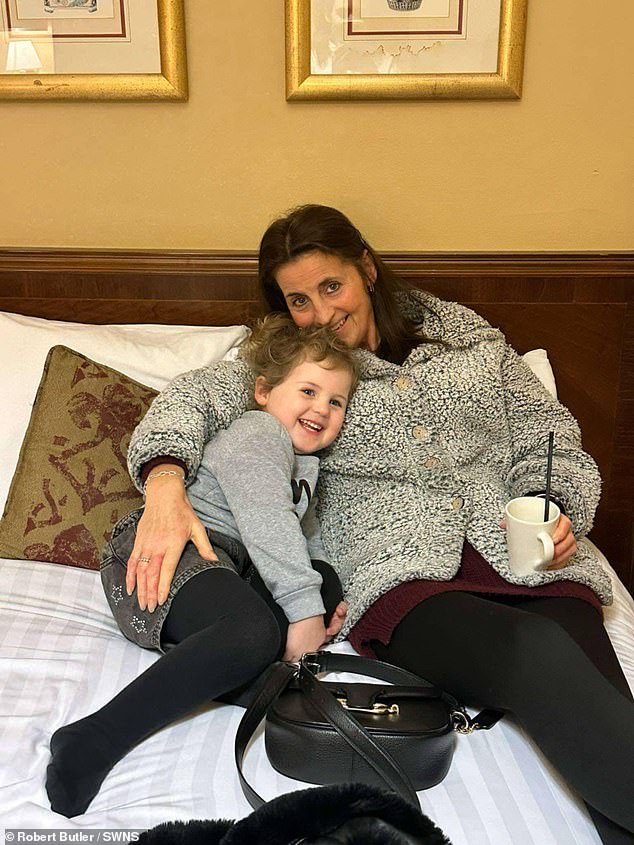A mother-of-two has been told she has only a few months to live—after doctors took two years to spot bowel cancer that had left her in so much pain she could ‘barely walk’.
Julie Butler, 55, from Yorkshire, first began experiencing strange symptoms in early 2020, suffering pain in her gut and gaining two stone in weight despite not changing her diet or exercise routine.
Her GP carried out a scan on her reproductive organs and concluded her symptoms were likely caused by fibroids—non-cancerous growths that develop in or around the womb.
The grandmother was told she would need a hysterectomy to combat the pain, but due to Covid delays, an operation wasn’t available for another two years.
By which point, Ms Butler said, she could ‘barely walk’ and had developed extreme bloating.
‘I was bloated all the time,’ she said. ‘It looked like I was nine months pregnant.
‘But doctors couldn’t put a finger on it.’
The caterer underwent the surgery in July 2022, but the bloating persisted.

Ms Butler’s first thought, when diagnosed with stage four cancer, was that she wouldn’t live to see her granddaughter’s first day of school
During a meeting to see how Julie was doing since the hysterectomy, a scan revealed that she had a blockage in her bowel and she was sent for an operation to correct the problem.
But during the operation doctors discovered two tumours in the grandmother’s lower bowel.
‘They said the tumours had gone into my lymph nodes, so they removed them too,’ she said.
‘Doctors told me it was cancer but sent the tumours off for a biopsy to double check.’
The biopsy confirmed colon cancer, and doctors told them they were 95 per cent sure they had removed all the disease, but couldn’t be certain.
Doctors advised that Julie should start chemotherapy, but after two major operations, she was too ill to complete the treatment.
A year later, Ms Butler started to feel ill again, so doctors referred her for an MRI, CT and PET scan in April 2023.
The scans showed that the cancer had spread to her lung, liver and spleen, meaning her cancer was now stage four—when it is often considered incurable.

Julie’s husband Robert is hoping to raise £4,000 to take his wife to Germany to undergo a form of cancer treatment she cannot access on the NHS
Doctors delivered the devastating news that she likely had just three months to live.
‘I have a granddaughter, and I was thinking about how I wanted to see her grow up,’ she said.
‘The day I got told I was stage four, I was worried I would never see her in her first school uniform.’
Despite undergoing three different types of chemotherapy treatment since, her cancer is still continuing to grow.
‘The NHS wants to try a fourth chemo,’ said her husband Robert, a hedge cutter.
‘But it is a catch-22 situation. Her liver is in serious trouble. If we carry on with the chemo and it doesn’t work, she will end up with liver failure.’
The couple are hoping to fly out to Germany so Ms Butler can undergo a specialist form of chemotherapy knownas Trans arterial chemoembolization (TACE).
The treatment delivers chemotherapy directly into the blood vessels that feed a tumour, blocking the blood supply to the cancer.

The mother of-two first began suffering symptoms in 2020, but wasn’t diagnosed until the end of 2022

Her husband said that the grandmother will die unless she can access a specific type of chemotherapy that’s typically only offered to liver cancer patients
TACE is available on the NHS for the treatment of primary liver cancer, but Julie’s liver cancer is secondary, meaning she is not eligible for the treatment.
‘We have no choice now, we need to try it,’ said Mr Butler, who is hoping to raise £40,000 to fund the therapy.
‘If we don’t try this, Julie is going to die, we have to do it.
‘The fact that people have been donating to help Julie shows that angels exist and there are good people out there.’
It comes as a global study of disease in 50 countries found rates of bowel cancer in under 50 year-olds are rising in 27 of the 50 nations.
England is averaging a 3.6 per cent rise every year—one of the highest rises.
Researchers from the American Cancer Society, who led the research said the rise in early onset cancers is no longer limited to high-income Western countries but is now a ‘global phenomenon’.
Some US research has suggested ultra-processed foods are causing chronic inflammation in the gut, which can lead to the disease.
They suggested switching foods such as cured meats, mass-produced bread and ice cream in favour of healthier alternative such as oily fish, fruit and vegetables is ‘vital’ to staving off the disease.
Around 44,000 people of all ages are diagnosed with bowel cancer in the UK every year, according to charities.



